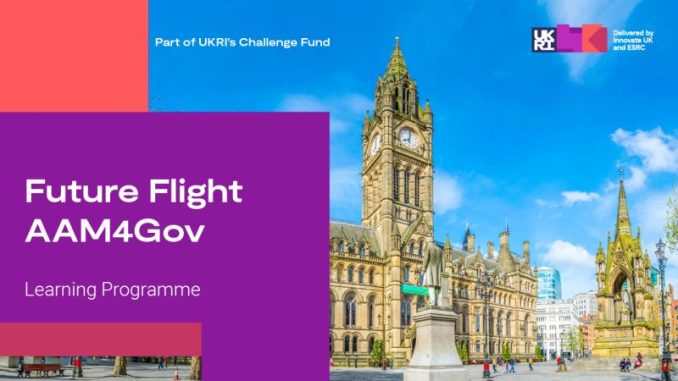
Future Flight Challenge, delivered by Innovate UK and the Economic and Social Research Council (ESRC), is supporting a new programme for UK local authorities to learn more about future flight, and for the future flight industry to gain a better understanding of how to engage with local authorities.
AAM4Gov is the new drone and Advanced Air Mobility (AAM) learning resource for industry, local authority officers, elected councillors and other community stakeholders. The programme will help to educate and inform local authorities about developing future flight technologies and services, helping to equip them with the skills and expertise to start integrating drones and AAM into their operations and transport planning. The programme also provides businesses across the drone and AAM sectors with resources to better understand how to engage with local authorities, in terms of procurement and understanding the priorities of councils. The educational modules offer a variety of topics ranging from legal, regulatory and economic issues, as well as the best ways to engage with the public when discussing future flight technologies.
The courses, available at no cost, have been funded by the UK Research and Innovation Future Flight Challenge and developed with the support of ARPAS-UK, the UK’s drone trade association, in partnership with Urban Air Mobility News, and have been validated by a range of industry experts and regulatory bodies.
“Local authorities are vital stakeholders in this industry, yet only a handful are fully engaged in the process of working with AAM operators to balance the needs of their communities with the benefits these new technologies can bring, said Philip Butterworth-Hayes, AAM4Gov Editorial Director. “We have highlighted the statutory responsibilities which can be supported by wider use of drones – helping to save lives, reduce costs while improving air quality and initiatives aimed at reaching net zero harmful emissions.”
Close collaboration between the aviation industry and local authorities is fundamental for the adoption of drones and AAM that can better serve urban and rural areas,” said Kerissa Khan, Co-Chair, Future Flight Community Integration Group. These tailored training resources play a pivotal role in equipping key stakeholders with essential knowledge to address critical aspects of integrating future flight technologies into communities. By bridging knowledge gaps, these resources help pave the way for a smoother transition of innovative sustainable transport solutions across the UK.”
The AAM4Gov programme courses will be available either as ‘solo’ versions, or interactively as online groups with support from industry experts, and cover topics including:
- An introduction to Advanced Air Mobility and Urban Air Mobility
- Community benefits of drones and eVTOLs
- Drone security
- AAM And the law
- AAM policy making
- Local government explained
- Blue-light services
- Transport planning and infrastructure
- How councils are using drones
- Airfield and aerodrome development opportunities
- Drone and AAM impact concerns and public consultation
For more information
Breaking down barriers for future flight with local authorities and industry

